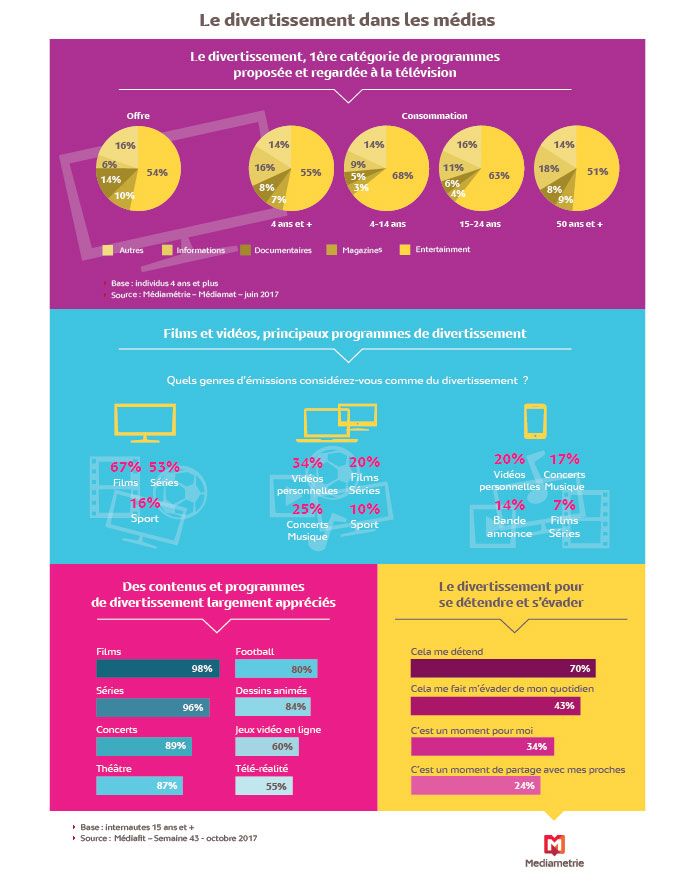- Home
- Results & Studies
- TV viewers consider a vast amount of television programmes and Internet content to be entertainment
TV viewers consider a vast amount of television programmes and Internet content to be entertainment

Focus on the new facets of entertainment as part of a study carried out by Médiamétrie for ADETEM, the French Association of Marketing Professionals.
To inform, cultivate, entertain... From the outset, television has striven to perform these three functions. Since then, it has markedly evolved by taking viewers’ expectations into account. Households have gone from having one small screen to several, in different formats: television set, tablet, computer, smartphone. This means that there are more opportunities to relax, at any time, wherever one wants, and by any means: films, series, television films, concerts, theatre, sports, reality TV, short programmes, video games... Even the notion of entertainment to a greater or lesser extent emerges through a broad range of programme genres, whatever the professional criteria for classifying them with respect to the legal obligations of the programme. The viewer’s perception has become an indispensable concept. For the consumer, entertainment has moved beyond its strict meaning; it is no longer conventionally limited to game shows and musical variety shows. Many more programmes than one might think are now considered by the public as entertaining. Entertainment has significantly expanded its territory and is much more watched than we can imagine.
Entertainment makes up the majority of programmes
Entertainment, in its broadest sense, has been promoted. It encompasses films, series, talk shows, reality TV, fiction, children’s shows, game shows, comedy shows, variety shows and modern music. It now reigns supreme. In fact, it makes up the majority of the televised programmes on offer (54%). No other category of programme comes close to it: documentaries represent only 14% of the total offer, reviews 10%, and news programmes 6%, while other genres make up the remaining 16%.
This large volume on offer corresponds to the desire to meet the expectations and demand of the largest portion of viewers. Variations in consumption are a clear reflection of this approach. Audiences aged 4 years and over spend 55% of their time following entertainment; they devote 16% to watching news programmes, 8% to documentaries and 7% to reviews.
Kids are huge fans
Entertainment, accessible to a wide audience, thus brings together all segments of the public. But which type of TV viewer is the biggest fan? Those who leave their homes the least, i.e. people aged 50 and over? They certainly do spend more time than average in front of their screens. But in actual fact the biggest consumers are young people, who are, however, the most willing to leave their homes. Those aged 4 to 14 spend 68% of their viewing time watching entertainment programmes. Those aged 15 to 24 nearly as much, with 63%. This reveals a very marked difference compared to those aged 50 years and over, who devote 51% of their viewing time to entertainment.
Videos are a hit on the Internet
Entertainment is also widely watched on the Internet. It is offered by video websites – the main one being YouTube – and catch-up websites – MyTF1, Allociné, DailyMotion, France Télévisions, 6Play, etc. Every month, they receive 24 million unique visitors (UV). Young people, men and individuals from upper SPCs are particularly addicted to these short and easy-to-watch clips. The public spends three and a half hours per month watching entertainment videos, a trend which is on the rise. The smartphone is a strong factor in consumption. Mobile phones have overtaken computers: users spend an average of 3 hours and 6 minutes watching entertainment videos on them. YouTube receives 30 million unique visitors every month.

Films and series are emblematic of entertainment
The idea of entertainment has taken shape and expanded its reach. For the public, televised entertainment is a term which goes beyond content labelled as such, like broadcasts of musical variety shows, game shows and theatre. Nowadays, fiction in its broadest sense, i.e. motion pictures and series, enters the picture. More than that, it takes pride of place. This is the key lesson taken from the survey of people aged 15 and over. When asked “what genres of broadcast do you consider to be televised entertainment?”, 80% answer films and 74% TV series. Concerts and theatre performances are much less cited: only 36% regard them as entertainment. Other programmes are also considered as entertainment, to a lesser extent: cartoons (32%), football matches (28%) and reality TV shows (20%).
This perception of the idea of entertainment varies greatly depending on age. Among 15 to 24 year olds, two out of three TV viewers (65%) consider films and series to be emblematic of entertainment. Reality TV is also very popular: it is entertainment for 42%. Those aged 25 to 34 have a different perspective. For them, series are more emblematic – 80% consider them to be entertainment – followed closely by films (76%); a third category that is very highly rated in this age segment is cartoons: 45% deem them to be entertainment, undoubtedly because many of these adults have children who watch them. Those aged 35 to 49 put films (entertainment for 80% of them) and series (79%) on an almost equal footing; however, cartoons get their fair share (36%).
People aged 50 and over differ less from the younger groups than one might imagine. In fact, for them, films make up an even greater proportion of their consumption: 85% consider them as entertainment, much more so than series (70%). As for theatre performances, these are cited by 53% of them.
Perceptions are different for online entertainment. The range of programmes is effectively broader, as a result of there being many thousands of videos. Series and films dominate for the 15+ group. Almost half of those questioned cite them as entertaining content. Next come online video games: these are well and truly established, having come to represent entertainment for almost three out of ten people. They have clearly gained the upper hand over concerts, cartoons and short videos, and more strikingly over web series, theatre performances and football matches.
The size of the screen undoubtedly tends to change viewers’ perception of the content. In addition, perception varies with age. Online video games, series and films are particularly emblematic of Internet entertainment among 15 to 24 year olds. Those aged 25 to 34 prefer series and films, and remain highly addicted to online video games. Less 35 to 49-year-olds see fiction as entertainment; the same goes for films. Online video games are even less popular. Lastly, in the 50+ group, an overall majority does not consider films or series to be entertainment.
A wide range of tastes
Overall, the public considers a large amount of broadcasts to be entertainment, both on channels and on websites. This means they are popular and liked, but to what extent? The study provides a useful clarification. “How much do you like the following content considered entertainment?”, was one of the questions asked. Assessment: the content in question certainly gets a very mixed reception, but is also very popular. All age segments combined, the Palme d’Or goes to films (liked by 98%), making this an incredibly popular category. The same can be said of series. Concerts and theatre performances are rated higher than one would imagine. Cartoons are liked more than football. Online video games also receive excellent scores (60%) and reality TV gets an overall majority (55%).
The main reason why television viewers or Internet users watch so many entertainment programmes lies in the need to relax. This is a key factor: 70% of respondents say so. Escaping day-to-day life is also a strong incentive: 43% express this opinion. It is also a way to enjoy oneself, to have some “me-time”, according to 34%. Or even a way to spend time with loved ones (24%).
Over time, television and Internet content has become an unavoidable topic of conversation. We talk about it together before, during and after the broadcast. Either we do so with people who are physically present, or we communicate with others on social networks. Technology evolves, and the generations keep up.
Three questions for Bruno Schwobthaler, President of Adetem’s Entertainment Club and CEO of the agency Licensing for Growth
How do you explain this boom in entertainment?
Historically, entertainment has always been key: the Romans’ “panem et circenses” (bread and games) prefigured the TV dinner of today!
The explosion of new media has made it possible to bring entertainment to the forefront to an even greater degree, making it a new frame of reference for communication: we’re living in the age of story-telling on every level.
And the facts can be found in the study: for 70% of people, entertainment is relaxation! These diverse activities can be easily accessed, often for free or at a low cost, and offer an unlimited choice of genres and subjects! As a result, it’s not surprising that most people make entertainment their main focus, QED! In short, it’s a cheap and legal way to relax!
What lessons have you taken from this study in terms of marketing?
A number of things can be said about the factual aspects regarding the consumption of entertainment-based content.
Firstly, there is a discrepancy between the reality of the figures – which demonstrate the primacy of entertainment over all the target audiences – and the behaviour of marketing managers, who in their vast majority still favour partnerships and investments in sport over those in entertainment.
Secondly, entertainment operators need information and explanations to allow them to work better with the brands and the marketing managers and agencies who manage them.
Finally, it has been found that increasingly, for every type of communication, entertainment and its principles will serve as a benchmark and a reference.
What reflections are you taking to ADETEM on the topic of entertainment?
The first is to take account of its importance for all the target audiences and the creation of the Entertainment Club is the first step in this: the role of the club is to act as facilitators between marketing managers and entertainment operators, who in the past might have tended to communicate little or badly, with a few notable exceptions. But other players such as the media, agencies and research companies for example also have a role to play, and we therefore welcome initiatives like Médiamétrie’s which offer analyses such as this one.
Marc Pellerin
des médias
edition
definitions